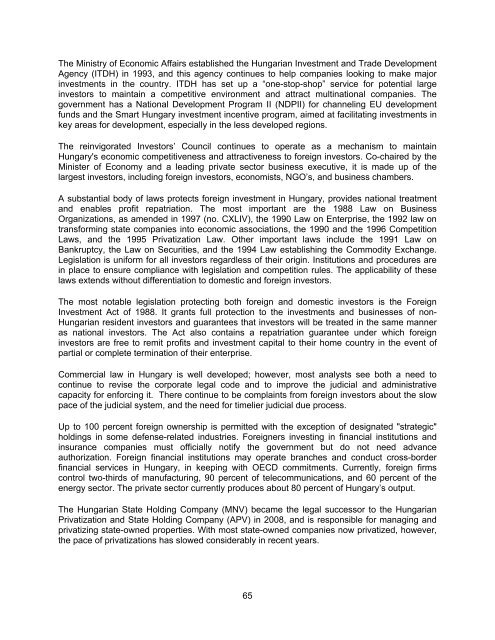Doing Business in Hungary 2010 - International Franchise Association
Doing Business in Hungary 2010 - International Franchise Association
Doing Business in Hungary 2010 - International Franchise Association
Create successful ePaper yourself
Turn your PDF publications into a flip-book with our unique Google optimized e-Paper software.
The M<strong>in</strong>istry of Economic Affairs established the Hungarian Investment and Trade Development<br />
Agency (ITDH) <strong>in</strong> 1993, and this agency cont<strong>in</strong>ues to help companies look<strong>in</strong>g to make major<br />
<strong>in</strong>vestments <strong>in</strong> the country. ITDH has set up a “one-stop-shop” service for potential large<br />
<strong>in</strong>vestors to ma<strong>in</strong>ta<strong>in</strong> a competitive environment and attract mult<strong>in</strong>ational companies. The<br />
government has a National Development Program II (NDPII) for channel<strong>in</strong>g EU development<br />
funds and the Smart <strong>Hungary</strong> <strong>in</strong>vestment <strong>in</strong>centive program, aimed at facilitat<strong>in</strong>g <strong>in</strong>vestments <strong>in</strong><br />
key areas for development, especially <strong>in</strong> the less developed regions.<br />
The re<strong>in</strong>vigorated Investors’ Council cont<strong>in</strong>ues to operate as a mechanism to ma<strong>in</strong>ta<strong>in</strong><br />
<strong>Hungary</strong>'s economic competitiveness and attractiveness to foreign <strong>in</strong>vestors. Co-chaired by the<br />
M<strong>in</strong>ister of Economy and a lead<strong>in</strong>g private sector bus<strong>in</strong>ess executive, it is made up of the<br />
largest <strong>in</strong>vestors, <strong>in</strong>clud<strong>in</strong>g foreign <strong>in</strong>vestors, economists, NGO’s, and bus<strong>in</strong>ess chambers.<br />
A substantial body of laws protects foreign <strong>in</strong>vestment <strong>in</strong> <strong>Hungary</strong>, provides national treatment<br />
and enables profit repatriation. The most important are the 1988 Law on <strong>Bus<strong>in</strong>ess</strong><br />
Organizations, as amended <strong>in</strong> 1997 (no. CXLIV), the 1990 Law on Enterprise, the 1992 law on<br />
transform<strong>in</strong>g state companies <strong>in</strong>to economic associations, the 1990 and the 1996 Competition<br />
Laws, and the 1995 Privatization Law. Other important laws <strong>in</strong>clude the 1991 Law on<br />
Bankruptcy, the Law on Securities, and the 1994 Law establish<strong>in</strong>g the Commodity Exchange.<br />
Legislation is uniform for all <strong>in</strong>vestors regardless of their orig<strong>in</strong>. Institutions and procedures are<br />
<strong>in</strong> place to ensure compliance with legislation and competition rules. The applicability of these<br />
laws extends without differentiation to domestic and foreign <strong>in</strong>vestors.<br />
The most notable legislation protect<strong>in</strong>g both foreign and domestic <strong>in</strong>vestors is the Foreign<br />
Investment Act of 1988. It grants full protection to the <strong>in</strong>vestments and bus<strong>in</strong>esses of non-<br />
Hungarian resident <strong>in</strong>vestors and guarantees that <strong>in</strong>vestors will be treated <strong>in</strong> the same manner<br />
as national <strong>in</strong>vestors. The Act also conta<strong>in</strong>s a repatriation guarantee under which foreign<br />
<strong>in</strong>vestors are free to remit profits and <strong>in</strong>vestment capital to their home country <strong>in</strong> the event of<br />
partial or complete term<strong>in</strong>ation of their enterprise.<br />
Commercial law <strong>in</strong> <strong>Hungary</strong> is well developed; however, most analysts see both a need to<br />
cont<strong>in</strong>ue to revise the corporate legal code and to improve the judicial and adm<strong>in</strong>istrative<br />
capacity for enforc<strong>in</strong>g it. There cont<strong>in</strong>ue to be compla<strong>in</strong>ts from foreign <strong>in</strong>vestors about the slow<br />
pace of the judicial system, and the need for timelier judicial due process.<br />
Up to 100 percent foreign ownership is permitted with the exception of designated "strategic"<br />
hold<strong>in</strong>gs <strong>in</strong> some defense-related <strong>in</strong>dustries. Foreigners <strong>in</strong>vest<strong>in</strong>g <strong>in</strong> f<strong>in</strong>ancial <strong>in</strong>stitutions and<br />
<strong>in</strong>surance companies must officially notify the government but do not need advance<br />
authorization. Foreign f<strong>in</strong>ancial <strong>in</strong>stitutions may operate branches and conduct cross-border<br />
f<strong>in</strong>ancial services <strong>in</strong> <strong>Hungary</strong>, <strong>in</strong> keep<strong>in</strong>g with OECD commitments. Currently, foreign firms<br />
control two-thirds of manufactur<strong>in</strong>g, 90 percent of telecommunications, and 60 percent of the<br />
energy sector. The private sector currently produces about 80 percent of <strong>Hungary</strong>’s output.<br />
The Hungarian State Hold<strong>in</strong>g Company (MNV) became the legal successor to the Hungarian<br />
Privatization and State Hold<strong>in</strong>g Company (APV) <strong>in</strong> 2008, and is responsible for manag<strong>in</strong>g and<br />
privatiz<strong>in</strong>g state-owned properties. With most state-owned companies now privatized, however,<br />
the pace of privatizations has slowed considerably <strong>in</strong> recent years.<br />
65
















